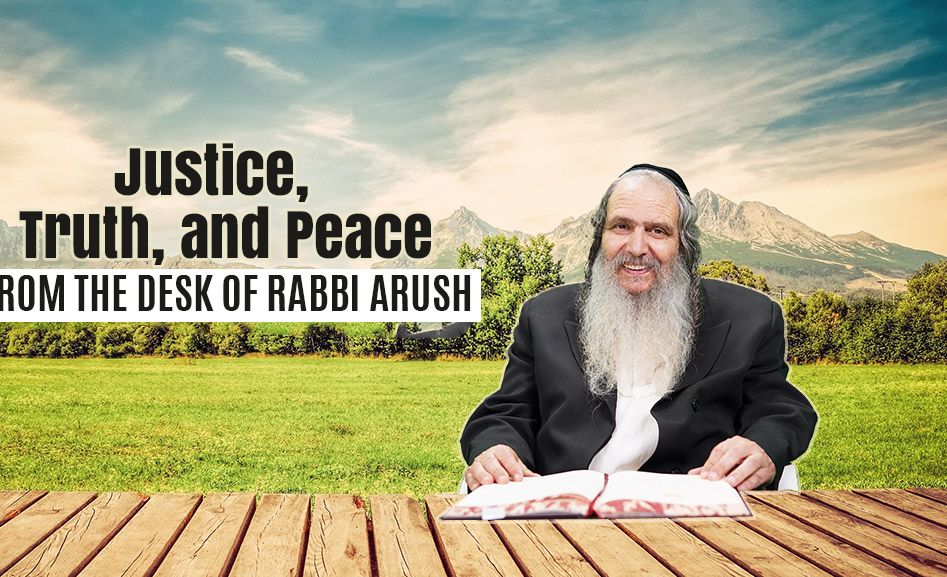
I Love Your Name
Nothing seemed wrong, yet Esther and Kobi had difficult marital problems. Kobi said, “She makes me feel like a prison inmate with a number and no identity.” What was askew?

Esther and Kobi were having difficult marital issues. Their community rabbi suggested that they see a well-reputed marital counselor who was a rabbi and Torah scholar as well. Their first session was weird. The counselor asked Esther what complaints she had about her husband. She had none. He then turned to Kobi and asked him the same question. He had almost no complaints either; he admitted that Esther was a good wife and mother; she handled money thriftily and responsibly. She was never slovenly and maintained an attractive appearance.
“So what’s the problem?” asked the counselor.
Kobi said, “Sure, she’s honest, upright and responsible. The kids adore her, no doubt. She’s attractive too, from the outside. But, she makes me feel like I live with a robot. She doesn’t smile much to me and she never addresses me by my name. She makes me feel like a prison inmate with a number and no identity. I hate hearing, ‘Hey, you’. It dries up my soul! Rabbi, I do have a name.”
The counselor defended Esther and said, “Kobi, you grew up in a secular background, correct?”
“Yes, Rabbi – how do you know?”
“In many Torah-observant homes, parents don’t address each other by first names so that the children won’t end up calling their parents or referring to them by first name, for that’s disrespectful. Esther probably grew up in a home like that…” – Esther nodded in the affirmative – “whereas you did not.”
“I’m fine with that, Rabbi. ‘Tatty’ or ‘Abba’ is just as sweet to my ears as ‘Kobi’; every other couple I know in the community calls each other ‘Mommy’ and ‘Tatty’ or ‘Ima’ and ‘Abba’ in front of the children. She calls me with a pronoun. She refers to me as a pronoun. She’s robbed me of my name, my identity. She even says to the kids, ‘Go ask him’, not ‘go ask Daddy’. I can’t stand it – it makes me feel like I have no connection with her. Maybe I’m a dumb BT in your eyes, but that’s how I feel. I give Esther everything. I ask for nothing in return other than to be uplifted from the status of a pronoun.”
“Heaven forbid, Kobi – you’re anything but dumb. In addition to a high IQ, you have a high EQ.”
“What’s that?”
“Emotional Quotient; you have very legitimate feelings, Kobi. This is something we must help Esther with.”
During subsequent one-on-one sessions, the marital counselor discovered that Esther was a pronoun to her parents. She had internalized their ways even though she objected to them. He coached her how to accustom herself call Kobi “Tatty” in front of the children, and “Kobi” when they were alone. At first, she had to force herself. But once she did, their marriage turned completely around for the better.
* * *
Rebbe Levi Yitzchak of Berditchev asks a question: why do our sages obligate us to say so many benedictions every day, from the moment we wake up in the morning until the moment we go to sleep at night? The Rebbe answers his own question and says that the more we address someone by their name, the more we create an emotional attachment of affinity to them. With this in mind, the more we call Hashem’s Name, the more we become lovingly attached to Him. That’s why we must say so many blessings every day.
 The Gemara (tractate Taanit 25b) tells a story about a terrible drought in the Land of Israel. The great rabbi of the generation, Rabbi Eliezer the Great (Eliezer ben Horkonus) prayed profusely, yet not a single cloud appeared. Rebbe Akiva, his student, prayed too, appealing to Hashem in a way that no one else had done before – Avinu Malkenu, “our Father the King”. Right away, the sky darkened with thick gray clouds and torrents of rain blessed the parched soil of the Land of Israel.
The Gemara (tractate Taanit 25b) tells a story about a terrible drought in the Land of Israel. The great rabbi of the generation, Rabbi Eliezer the Great (Eliezer ben Horkonus) prayed profusely, yet not a single cloud appeared. Rebbe Akiva, his student, prayed too, appealing to Hashem in a way that no one else had done before – Avinu Malkenu, “our Father the King”. Right away, the sky darkened with thick gray clouds and torrents of rain blessed the parched soil of the Land of Israel.
What was the secret of Rebbe Akiva’s prayers? By the way he addressed Hashem, he revealed his deep, intimate and steadfast connection with Hashem, not only his King but his beloved Father in Heaven as well. Rebbe Akiva’s loving connection to Hashem – expressed by the way he addressed Hashem – was so strong that even during his last moment on earth when he suffered indescribable torture to sanctify Hashem’s Name while dying a martyr’s death, he had a smile on his face.
A person cannot imagine the power of personal prayer when he or she calls out to mein libbe Tatte in Himmel (Yiddish), Avi ahuv shebashamayim (Hebrew) – my beloved Father in Heaven. Merely saying these words once is balm for the soul. Speaking to Hashem daily for an hour like this is the best guarantee on earth for a healthy soul. Don’t be formal – address Hashem in the most affectionate way you can and of course in the most sincere way you can. This ties your soul to Hashem. “Hashem, I love You and I love Your holy Name.”







Tell us what you think!
Thank you for your comment!
It will be published after approval by the Editor.